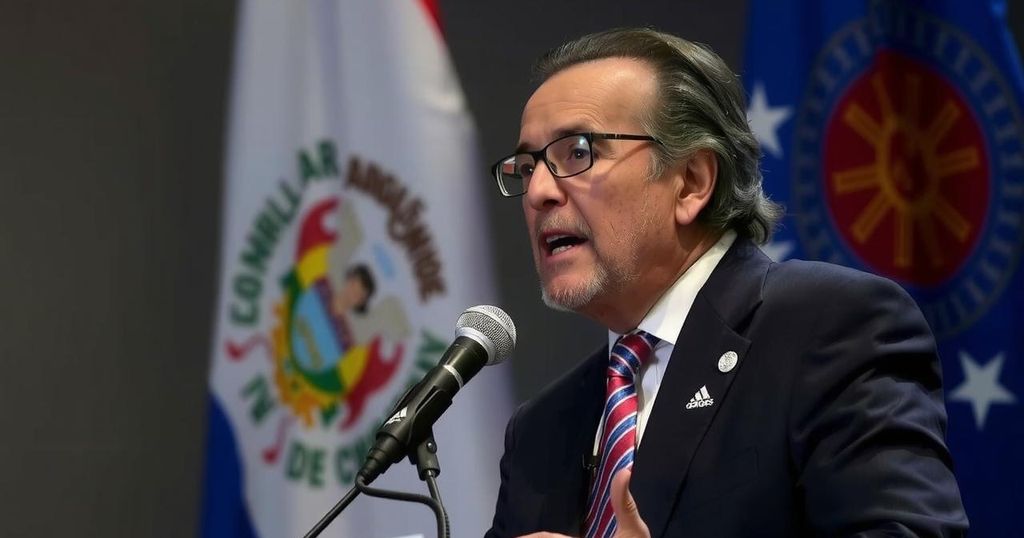Yamandú Orsi has won Uruguay’s presidency, marking the return of the Broad Front after five years. Securing 49.8% of the vote against Álvaro Delgado, Orsi emphasizes unity and continuity. He faces key challenges including rising poverty and crime as he prepares to assume office in March 2025. The election also reflects a global pattern favoring opposition candidates.
In a historic runoff election, Yamandú Orsi has emerged victorious as the new President of Uruguay. His election symbolizes the return of the Broad Front, which previously governed the nation for 15 years until the center-right National Party’s Luis Lacalle Pou assumed office in 2019. The 57-year-old, a former history educator and twice-elected mayor, outperformed Lacalle Pou’s successor, Álvaro Delgado, securing 49.8% of votes to Delgado’s 45.9%. This election represents a trend of opposition wins across various global contexts, with voter turnout nearing 90% due to Uruguay’s mandatory voting laws.
Álvaro Delgado, a close ally of Lacalle Pou and a veterinarian, conceded the election with a sense of disappointment, emphasizing the difference between losing elections and being defeated. President Lacalle Pou, who is constitutionally prohibited from seeking another term, extended his congratulations to Orsi and committed to a seamless transition of power. Orsi, slated to take office on March 1, 2025, has pledged to unify the nation amidst the close electoral results.
Orsi’s win marks the resurgence of the Broad Front, which had previously made strides in poverty alleviation and economic growth during its governance. Notably, under former President José “Pepe” Mujica, who served from 2010 to 2015, Uruguay saw significant social reforms, including the legalization of abortion and same-sex marriage, and the progressive legalization of marijuana in 2013. Desk analysts regard Mujica’s policies and administrative style as a source of inspiration for Orsi, framing the latter’s campaign as a blend of progressive welfare programs and market-friendly strategies.
In his victory speech, Orsi characterized his leadership approach as one that seeks to foster national dialogue and promote a cohesive society. His vice presidential candidate, Carolina Cosse, currently the Mayor of Montevideo, reflects Orsi’s vision for revitalization in various sectors, including agriculture and tax incentives for investment. However, Orsi faces pressing challenges such as rising childhood poverty currently affecting 25% of the nation’s youth and increasing crime associated with organized gangs. He has also expressed his intention to review a controversial trade agreement with China established under the previous administration.
Analysts have suggested that Delgado’s loss can be attributed to his campaign’s abrupt focus on criticizing the Broad Front instead of articulating a compelling vision for the future. This fear-based strategy reportedly fell short in resonating with voters. Orsi has recognized the necessity of including a broader coalition in future endeavors to enhance the nation’s prosperity, emphasizing an inclusive approach to governance and civil engagement.
In conclusion, Yamandú Orsi’s election as President marks a pivotal moment for Uruguay, reinstating the Broad Front’s governance amidst significant socio-economic challenges. As he prepares to lead the nation, Orsi’s agenda will seek to unify citizens and address key issues such as poverty and crime while bolstering economic partnerships. The dynamics of this election will undoubtedly influence not only Uruguay’s political landscape but also its future interactions within the broader Latin American narrative.
Yamandú Orsi’s ascension to the presidency represents a significant political shift in Uruguay, reinstating the Broad Front after a five-year hiatus under the National Party’s leadership. The Broad Front’s previous governance is noted for its progressive social reforms and economic advancements, which had a profound impact on the country’s socio-economic climate. The electoral context reveals a broader global trend favoring opposition candidates, highlighting a potential shift in political attitudes within the electorate at large. Additionally, Uruguayan politics operates within the framework of compulsory voting, contributing to high voter turnout and civic engagement levels, thereby affording a comprehensive reflection of public sentiment during elections.
Yamandú Orsi’s victory in the presidential election signifies both a return to the Broad Front’s governance and an opportunity to address pressing issues impacting Uruguay. His commitment to inclusivity and dialogue suggests a trajectory towards a more cohesive national identity. However, the challenges of poverty and crime present significant hurdles that Orsi will need to confront promptly. Miami, along with his predecessor’s acknowledgment of the electoral process, highlights the enduring respect for democratic values within Uruguay. As Orsi steps into leadership, the global community will be keenly observing how he navigates both political and social complexities.
Original Source: www.newsweek.com






